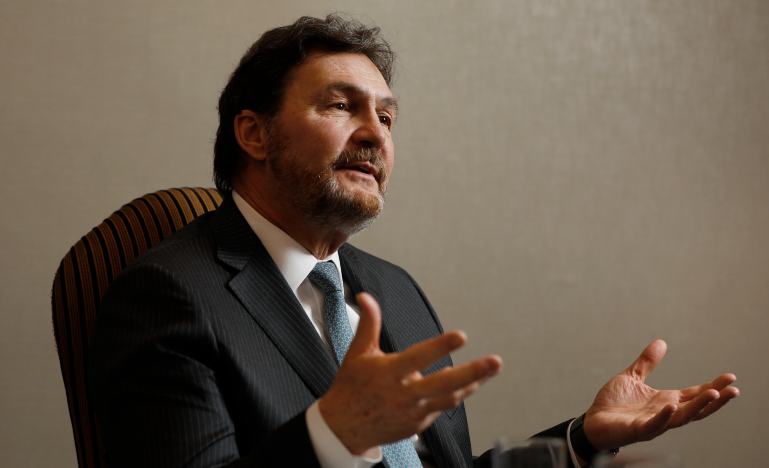Security at the Supreme Court must be a priority
At his annual press conference the Chief Justice discusses the courts work, the need for provinces to invest in justice, and the perils of disinformation.

The Chief Justice of Canada Richard Wagner is sounding a note of caution that the safety of the Supreme Court of Canada building needs to become a security priority.
"Most recent events have shown that the priority was put on the Parliament buildings and not so much on the Supreme Court building," he said during his annual news conference citing the Freedom Convoy occupation and a recently adopted bill to beef up security measures for U.S. Supreme Court justices.
Though security has been tightened in the wake of the 2014 attack on Parliament Hill, Wagner says that the Supreme Court has so far been overlooked.
Wagner also spoke about developments in the justice system in Canada, saying it must continue to modernize and innovate and warning it cannot return to pre-pandemic ways of doing business.
His remarks also discussed the risks stemming from disinformation, much of it pushed by social media, on the independence of the judiciary, which he said cannot be taken for granted.
"Disinformation is part of the explanation of what we went through in Ottawa last winter," Wagner said of the occupation of Wellington Street for three weeks. "Disinformation means that people who are in good faith can lose confidence in their institutions, and that can lead to regrettable behaviour."
"It simply confirms my opinion that we all have the responsibility of providing accurate information so that people can understand situations and learn more," Wagner said. He called on the media to "follow ethics rules" in reporting on justice issues despite the various constraints they face. "It's also the job of elected representatives to provide accurate information."
Concerning the risk of attacks on the judiciary, Wagner noted that he was somewhat comforted by the environment in Canada, where the appointment of judges is less politicized. He credited the nomination process at the Supreme Court where an independent committee of eight people recommends a short list of three to five candidates to the prime minister. For other appointments, the Justice Minister also follows the recommendation of independent boards. "It is a very transparent process, and we don't have this polarization that even the Americans will recognize in the appointment of judges—it's not good," he said. "But it's not in our DNA."
Wagner reminded journalists that he himself had been appointed by different governing parties. He expressed cautious optimism that the Supreme Court of Canada is less likely to suffer the same kind of leak of a draft opinion as we saw this year at the U.S. Supreme Court.
Wagner says he has no problem with criticism of his court's decisions, he said, but expressed concern with certain situations.
"I don't think government officials should criticize the judges," Wagner says. "They should act accordingly and legislate if they believe they have to in response to a judicial decision. It's good that decisions [are] discussed in the population—we engage in outreach activities to ensure that people understand our decisions, and maybe if they understand our decisions, the critics will be more positive."
Wagner also said that the justice system must continue to modernize and innovate, and that the courts must do their part, calling access to justice first and foremost a basic human need and an essential ingredient of democracy.
Given the backlogs and delays in the court system, Wagner said that the Action Committee on Court Operations in Response to COVID-19, which he co-chairs with the Minister of Justice David Lametti, continues to meet even as the pandemic eases. They recently published a roadmap to recovery for courts and administrators putting forward best practices to address backlogs and manage change more efficiently.
The SCC hopes to encourage remote hearings as the technology levels the playing field so that parties can make their submissions in a cost-effective manner.
"This improves access to justices, especially for intervenors like public interest groups that present the court with additional context and perspectives on challenging legal issues," Wagner said. "Strong, well-reasoned and persuasive arguments can be made from anywhere."
Wagner expects that a new secure and efficient e-filing portal for the SCC will be completed by the end of the year for both counsel and self-represented litigants.
When asked about the possibility of an avalanche of appeals stemming from the Jordan timelines exacerbated by the pandemic, Wagner lamented that judges are not getting the resources they need to do their jobs from provinces.
"That worries me, and if that leads to delays, and I know that has been the case because there weren't enough clerks in hearing rooms, there weren't enough officers of the court, so hearings were delayed—that's unacceptable," Wagner said. "I hope that members of the public are going to react to avoid coming back to a time when trials would be stayed because they couldn't occur within the timeline. We have to remain vigilant. The lessons in Jordan must be remembered."
Asked about the recent controversy surrounding a secret trial held earlier this year in Quebec, the Chief Justice noted only that "the open court principle in Canada is fundamental to our democracy."
The Quebec Court of Appeal heard arguments last week from parties demanding that details of the trial be disclosed. "We'll let [the Court of Appeal] work on their decision," said Wagner.
Wagner also said that a few weeks ago, he signed two new memoranda of understanding with the minister of justice, David Lametti. The first relates to judicial governance and serves to acknowledge that the principle of judicial independence includes the independence of the National Judicial Council in fulfilling its mandate to serve the public, and advances transparency by setting out the key provisions related to funding request and the essential role of the Council in the appointment of the Commissioner for Federal Judicial Affairs, who is responsible for supporting the Council's operations.
The second MOU relates to judicial education and establishes how the federal government and the Council engage with one another, while honouring their constitutional boundaries. It recognizes that initiatives concerning judicial education must be undertaken to respect judicial independence and embody transparency and accountability to the public.
This comes as the current government passed a law regarding the education of judges around sexual assault law in 2021. There is currently another private member's bill before Parliament on judicial education concerning violence against an intimate partner. That bill has already passed the House of Commons and is now in the Senate.
Wagner also discussed the work of the National Judicial Institute, which recently completed a project on judicial reform in Ukraine in partnership with Canada's Office of the Commissioner for Judicial Affairs.
"Working with their Ukrainian counterparts, Canadian judges offered one-on-one mentorship and training on judgment writing, gender equality, and managing conflicts of interest," Wagner said. "The NJI also supported initiatives aimed at improving the process for selecting and appointing judges, as well as improving judicial education and governance structures."


